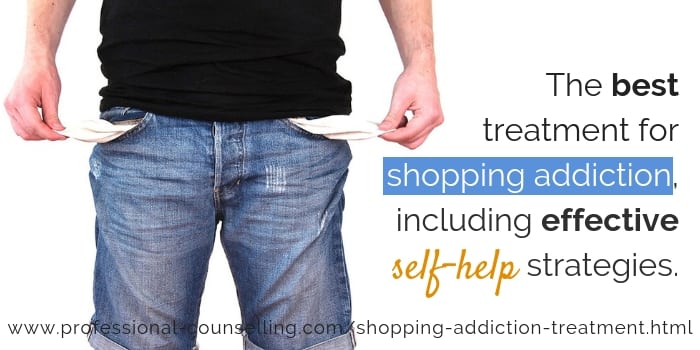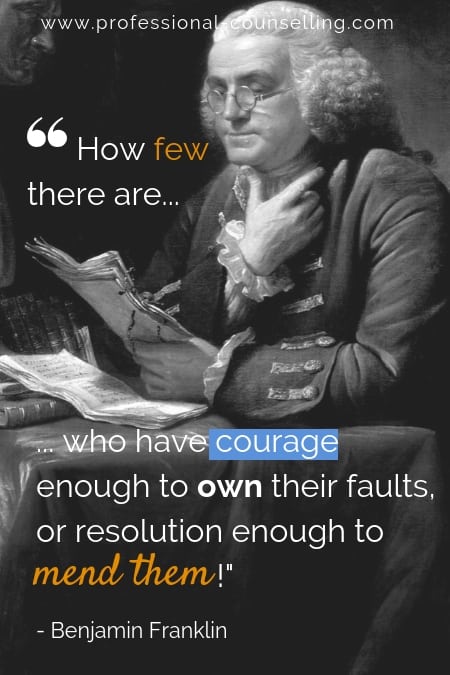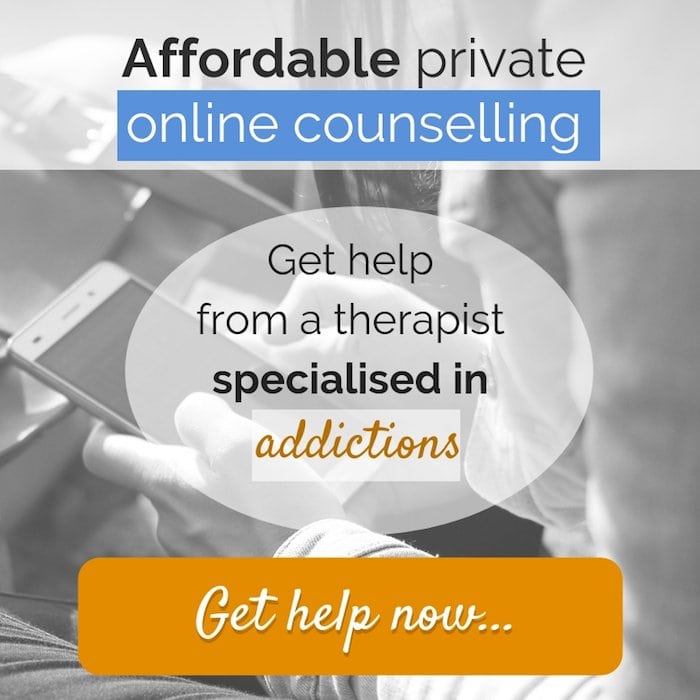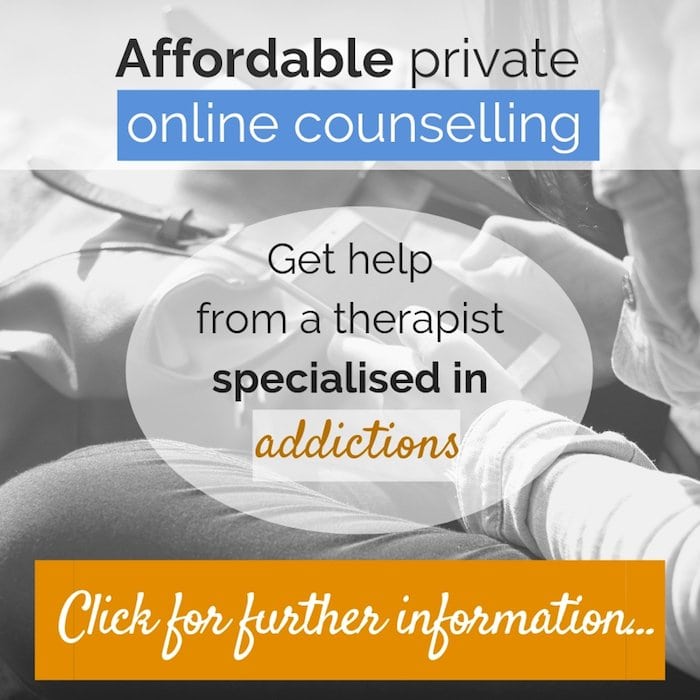Intimate Tickles Thought You Might Be Interested
Published: Wed, 12 Sep 2018 09:08:49 +0000
View Original Article
Category: Better Mood | Author and publisher: Elly Prior | First published: 10-09-2018 | Modified: 17-09-2018
Highlight any text to quote and share on Facebook!
Including effective self-help strategies
This is part 2 of my article on dealing with a shopping addiction. My aim here is to give you strategies which you can immediately begin to implement.
I’ll also give you an overview of available professional shopping addiction treatments.
Let’s start right away to help you beat that compulsive buying.
3 Steps to overcoming your shopping addiction
Step 1
The first step in overcoming any kind of addiction is to truly acknowledge the problem – no more denial! Know that by being here, you’ve already made a great start, and I really applaud you for that.
Next comes a trickier bit: being really honest with yourself about the scope of your problem. That includes the impact it’s having on your life and the lives of the people close to you.
It’ll probably take some courage to really face up to how your behaviour has affected your loved ones. It’s totally understandable if you feel embarrassed about what’s happening.
Many people in your position, though, feel paralysed by a sense of shame. And that complicates their recovery.
Do you recognise yourself in that?
If so, I want you to know that your shopping addiction has likely, at least partly, come about in an attempt to escape unhappiness or difficulties somewhere else in your life.
There is no shame in that.
Once you’ve acknowledged what you’re truly dealing with, you can start taking steps to put things right.
It’s time to restore some balance to yourself and your life.

Step 2
Now we need to find out where your life is most out of balance. I’m going to help you to easily and quickly get some useful insights.
Take a few minutes to download and fill in the Emotional Needs Worksheet (if you haven’t done that yet when you read Part 1). It will help you to discover which of your emotional needs aren’t being met. That’ll put you in a much better position to figure out where you need to concentrate your energies.
Whatever it is, it’s more than likely that I’ll have written an article to help you make a start with your healing journey.
Also, know that you were born with all the resources you need to problem solve. Not least, your unimaginably bright brain – regardless of what they might have told you about your abilities (positive or negative) at school. (To learn more about your inborn needs and resources, see my article on the human givens.)
Difficult to imagine right now, isn’t it?
But, I promise you, you’re far more capable than you think you are!
Whatever the audit uncovers for you, I hope it’ll give you a boost to know that you can take control of yourself and your life.
Doing this audit will also give you the confidence to discuss with a professional what you’d like to work on, should you choose to go for therapy.
Step 3: your own shopping addiction treatment plan
Take charge and make your own treatment plan. You won’t believe what a relief it will be to finally have some structure in your life.
Plan everything! Write a daily plan for the morning, afternoon and evening. Include small steps and chores you’ve neglected.
Start your journey by answering the following questions (write your answers down – here’s a free app for journaling):
- Which areas of your life need improving?
- Exactly how will you improve them? (Baby-steps are perfect!)
- How will you check on your progress?
- Who will you ask to help you by holding you accountable?
- What time of the day will you set to hold yourself to account?
 You are a star for getting this far in discovering how you can beat that craving to shop until you drop!
You are a star for getting this far in discovering how you can beat that craving to shop until you drop!How to overcome the cravings
Being prepared to face up to and ride out your craving without giving in will make it much easier for you to keep yourself in check.
So, the following is really important!
Know that it’s only a part of your brain that drives that craving. That part acts like a spoilt child constantly pulling at your trouser legs. Meanwhile, all the rest of your brain is available to deal with that… although, of course, it’s the child part that takes up most of your attention!
So, the child part needs to be distracted!
Start by telling yourself that you’ll do something else just for 5 minutes. Set a timer if you need to, and force yourself to concentrate on that something else for the entire 5 minutes.
Make sure it’s something you enjoy so it doesn’t feel like a punishment. Chances are, by the time the 5 minutes are up, the craving will have reduced enough for you to keep it at bay.
If you’ve missed the video at the start of this article, watch it now for some ideas:
Or, if the craving feels really unbeatable, call a trusted friend or your partner (be sure you’ve agreed together that it’s okay to do that). Ask them about their day or what they’ve been up to. Shift the focus away from yourself and the craving, and buy yourself the time you need to remain in control of your actions.
You get my drift now, I hope! So, start right away and make your own list. You’ll feel so much better for having something at the ready to divert your attention.
Do you need help?
Talk to an online addiction therapist…
Your problem is never too small or too big, too silly or too complicated to ask for help from an understanding and supportive licensed therapist…
I want to be upfront with you - I may earn a commission from Better Help. You pay the same fee, regardless.
Consumerism traps you must be aware of
Actively monitor your feelings and thoughts, and what you feel in your body, by writing them down – in particular:
- During the lead up to store sales
- During the lead up to holidays
- During the lead up to Thanksgiving and Christmas
- Special days: Black Friday, Cyber Monday, Boxing Day, Valentine’s Day, Singles Day
- Ads on television
- When switching TV channels
- When opening marketing emails
- Whilst watching a film – shopping and image-building
Advertising trigger words
Monitor your reactions to the following trigger words advertisers and marketers use to trigger your buying:
- sale, special, offer, free, now, deadline, limited.
And here are some words that advertisers use – on TV, online, in stores, in emails, etc – to remind you of your misery and motivate you to buy:
- had enough, never again, pointless, temporary fix, tired.
And these are the words they use to increase hope:
- bright, destiny, empower, overcome, undo. 1)
Be wary of the psychological tricks they’re using to try and tempt you into buying. Don’t fall for the spin, and don’t let them convince you that you simply must have whatever it is they’re selling.
By monitoring your thoughts and feelings when you’re exposed to clever advertising tricks, you can start to keep tighter control of your behaviour.
Notice how you respond, and don’t let yourself react immediately. Remind yourself of the tips above to help you overcome your cravings. When you’re in a calmer state of mind – without temptation at your fingertips – think rationally about whether or not buying is a good choice.
5 ways to make a start with recovery right now
- Go to your inbox and unsubscribe from all marketing emails (click the very small link at the bottom of the emails)
- Install an adblocker extension to your browser
- Delete all shortcuts to shopping sites
- Add an empowering reminder sticky to your desktop to keep you motivated in your recovery
- Stop unwanted marketing calls (search the term on Google for your country)
The best shopping addiction treatments
12 effective self-help strategies
- Ask someone you trust to take control of your finances if necessary – at least for the first month, but longer if you need it.
- Only take cash with you when you go out so you know you can only spend a limited amount
- Get help with your debts straight away
- Start using a budget app today
- Cut up your extra credit cards
- Avoid window shopping, or joining friends to do so
- Make a list of only essential items for your weekly shop, and stick to that list
- Choose a small local supermarket/general store if you have a choice
- Re-engage with leisure activities – ideally those that involve creativity and/or being around other – positive and supportive – people.
- Reconsider your friendships. If you have shopping mates and/or friends who are overly bothered about their image and who trigger your buying habits, avoid them at all costs.
- Consider getting involved in voluntary work. It can help to boost your self-esteem, develop your talents, and benefit other people, organisations or animals.
- Get into the habit of asking yourself before every purchase: “Do I really need this?” Delay gratification if you think you do, by really focusing on something else for a while.
Getting professional help to beat your compulsive buying
Any professional will take a two-pronged addiction treatment approach:
- Treatment for your addiction (make sure your therapist is qualified and experienced in treating addictions)
- Dealing with the underlying problems, as mentioned earlier
How and when they tackle these elements depends entirely on how you’re feeling and their expertise (find out how to choose a therapist).
You’ll definitely want to ensure that they are well-trained and highly experienced in the treatment of addiction. So, don’t be afraid to ask! If you’re at all unsure, seek someone else or ask to be connected with another therapist or doctor.
In any case, here are 7 treatments to consider:
- Therapy
Human Givens Therapy, if available in your country - Local Cognitive Behavioural Therapy (CBT)
A practical way to start making behavioural changes right away - Online therapy
It’s anonymous, very affordable in comparison with face-to-face contact and readily available - Medication
I’m afraid there’s no pill that will stop your compulsive shopping. But your doctor or therapist (if qualified to do so) may want to prescribe tranquillisers and/or antidepressants. Be absolutely sure that you’re informed about what that means! - Medication and therapy/counselling
Therapists and doctors might argue that this is the best option. But I’m afraid I’m really not a fan of medication. The side-effects and withdrawal symptoms post-medication all too often lead to further complications. Make sure that you’re fully aware of what it means to be on psychiatric medication, either by reading Dr Peter Breggin’s book or going to his Youtube channel. - Inpatient rehab
This is unlikely to be needed, unless you’re suffering from other addictions at the same time. If you do have inpatient treatment, do be aware that you’ll also need to learn to recognise the triggers and overcome the addiction(s) in your own environment. - Local group therapy
Your health provider may offer mental health group therapy. That would mean you’d get qualified support and advice on a regular basis. Ask your insurance or local practice or hospital. - Shopaholics Anonymous
Unfortunately, the link to Shopaholics Anonymous leads to the site of a treatment centre I don’t recognise. Therefore, I’d rather refer you to Spenders Anonymous.
Finally
Life as a shopaholic can be pretty challenging.
But it really is possible to overcome a compulsive shopping habit. Be consistent and honest in your efforts. You’ll see that you can make progress every day.
Keep your essential emotional needs at the front of your mind. You too can lead a happy, satisfying and fulfilling life. Let your essential needs be your guide. They’ll show you where you need to make a particular effort to improve your wellbeing – emotionally and physically.
Don’t be afraid to ask for the help you need, and don’t give up if you stumble every now and then. I know you can do this!
Please, rate this article …
I really hope this article is of help to you. 🙂
I frequently update my articles based on feedback, therefore I really value your vote.
Thank you so much in anticipation. 🙂
Do you need help?
Talk to an online addiction therapist…
Your problem is never too small or too big, too silly or too complicated to ask for help from a supportive and understanding licensed therapist…
Sources
Clark, Brian ClarkBrian, et al. “50 Trigger Words and Phrases for Powerful Multimedia Content.” Copyblogger, 20 Apr. 2009, www.copyblogger.com/trigger-words/. Accessed 9 Sept. 2018.

